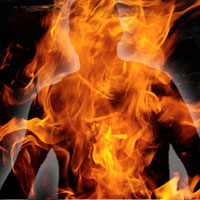This question recently made its way to me. I figured I’d give it a shot. Here we go…
He answered and said, Lo, I see four men loose, walking in the midst of the fire, and they have no hurt; and the form of the fourth is like the Son of God. Dan 3:25 KJV
The KJV is the only version that says “Son of God”. Although, it was fascnitating to discover that the original King James of 1611 did not capitalize the word son.
He answered and said, Loe, I see foure men loose, walking in the midst of the fire, and they haue no hurt, and the forme of the fourth is like the sonne of God. Dan 3:25 1611 KJV
Here is the passage from two of the more modern literal Bibles:
He said, “Look! I see four men loosed and walking about in the midst of the fire without harm, and the appearance of the fourth is like a son of the gods!” NASB
He answered and said, “But I see four men unbound, walking in the midst of the fire, and they are not hurt; and the appearance of the fourth is like a son of the gods.” ESV
Later, Nebuchadnezzar says: [Then] Nebuchadnezzar spake, and said, Blessed [be] the God of Shadrach, Meshach, and Abednego, who hath sent his angel, and delivered his servants that trusted in him, and have changed the king’s word, and yielded their bodies, that they might not serve nor worship any god, except their own God. Dan 3:28 (Italics added)
In this instance, the King clearly refers to the fourth man as an angel. The terms “sons of God” was sometimes used to refer to Angels in the Bible:
Now there was a day when the sons of God came to present themselves before the LORD, and Satan came also among them. (Job 1:6; ).
Again there was a day when the sons of God came to present themselves before the LORD, and Satan came also among them to present himself before the LORD. (Job 2:1)
When the morning stars sang together, and all the sons of God shouted for joy? (Job 38:7)
The terms “angel” and “son of God” are used synonymously. However, the King wouldn’t even have to necessarily be referring to God’s angel at this point. The King was clearly Pagan, and worshipped multiple false Gods. To call the majestic figure that miraculously showed up a “son of the gods”, would make sense. It is possible that word of the Hebrew God had reached the king through Daniel or someone else. Perhaps the King was aware of God’s majesty and his promise of a messiah. Nevertheless, the argument is nearly settled in Daniel 3:28 when the king refers to the fourth person as an angel.
It seems one could argue strongly for the cause of the fourth figure being an angel. Yet, in the King James Version text, we see that it clearly says, “the Son of God”. The revisers of the 1769 KJV even made a point to capitalize Son.
Daniel, was written in Aramaic. Let’s examine the original language used.
—– Below is excerpt from http://chatbible.com/HolyName.html
ELAH (ELAHIN, plural)
Strong’s lexical number: 426{Aramaic}
Formerly rendered: “G/god(s)”
Occurs 95 times within the Aramaic portions of pre-John the Baptist scripture, (78 times used of Yahweh; 15 times used of foreign gods; and 2 times used of some foreign god:)
In Daniel 2:47, both singular and plural forms appear as, your Elah [is] an Elah of elahin… In Daniel 3:14, Nebuchadnezzar is also recorded as saying, do not ye serve my elahin, nor worship the golden image which I have set up? Interestingly, Elah (not to be confused with the two individuals bearing the name) is the Aramaic equivalent of the Arabic Allah.
Since a sizable portion of the post-exilic or otherwise pre-John the Baptist Aramaic scripture (Ezra 4:6-6:18; 7:12-26; Daniel 2:4-7:28; and one sentence in Jeremiah 10:11) was written amidst heathens, their plural designation, elahin, is used exclusively of foreign deities, unlike the plural construct Hebrew usage of Elohim. For this reason, to emphasize its plurality, the English article the is always retained before such instances of elahin, and, therefore, special attention must be given to Daniel 3:25:
“He answered and said, Lo, I see four men loose, walking in the midst of the fire, and they have no hurt; and the form of the fourth is like the Son of God.” –KJV, 1769
This is particularly problematic since the King James translators here chose to present Nebuchadnezzar’s exclamation as a Messianic reference (using the English article the and capitalizing Son). Furthermore, they translated, in only this one particular instance, the plural Aramaic elahin as God (singular and capitalized)! The Aramaic text here reads: the form of the fourth is like a son of the elahin (bar elahin). Nebuchadnezzar was remarking that the fourth man appeared to be an angel (referenced as bar elahin – son of the gods, akin to the Hebrew, bene elohim – sons of God, note Daniel 3:28). Nevertheless, in the spirit of keeping with the King James rendering as much as conscience will allow, the expression has been rendered: the Son of elahin.
—– End Excerpt
Put simply, there is no definite article before Son in this passage. The word “the” in “the Son” should not be there.
I was able to find the marginal notes form the Geneva bible here: http://chatbible.com/daniel/3-25.asp.
Regarding Daniel 3:25, the note says, “For the angels were called the sons of God because of their excellency. Therefore the king called this angel whom God sent to comfort his own in these great torments, the son of God.” There is a believe that the translators of the KJV simply reproduced the Geneva Bible as is without taking into account this marginal note.
“The KJV merely reproduced the reading of its great predecessor, the Geneva Bible, which in turn precisely followed the Latin Vulgate, which in its turn literally followed the Greek translation of Theodotion. While precedent for the KJV’s translation can therefore be cited, nevertheless, the ASV et al., are squarely based on the ultimate and sole infallible authority, the Scriptures as originally written (Kutilek)”.
I’m not a Bible language scholar, nor do I read Aramaic. But in regards to this (rather unimportant) question, I tend to believe that God saved the Hebrew children from the fire, and he then sent his angel to minister to them. Here are the reasons based on what we just went over:
- The Aramaic text could have been translated as “son of the gods” and still been accurate (most likely more accurate in fact)
- sons of God was used to refer to angels in the Bible
- King Nebuchadnezzar calls the fourth figure an angel after the experience was over
- King Nebuchadnezzar said “like unto” the Son of God in the KJV, not “was the Son of God”.
Kutilek, Doug. “SON OF GOD OR A SON OF THE GODS (DANIEL 3:25) ?” The King James Only Resource Center. Web. 28 Jan. 2012. <http://www.kjvonly.org/doug/kutilek_son_of_god.htm>.



